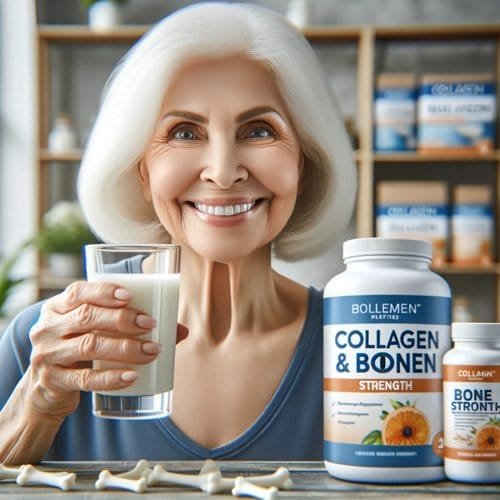Collagen & Bone Strength | How Collagen Supports Stronger Bones

Collagen is the most abundant protein in the human body and makes up about 30% of bone mass. It provides structure, strength, and flexibility to bones, helping to prevent fractures and osteoporosis.
According to the National Institutes of Health (NIH), collagen supplementation enhances bone mineral density (BMD) and improves calcium absorption.
Why Collagen is Essential for Bone Health
🦴 Builds Bone Structure & Flexibility
- Forms the bone matrix where calcium and minerals attach.
- Improves bone flexibility, reducing fracture risk.
💪 Enhances Calcium Absorption
- Works alongside vitamin D and magnesium to optimize calcium use.
- Helps retain calcium in bones instead of being lost.
🛡 Prevents Osteoporosis & Fractures
- Supports bone remodeling and regeneration.
- Reduces the risk of age-related bone loss.
❤️ Supports Joint & Cartilage Health
- Strengthens connective tissues in bones and joints.
- Helps reduce joint pain and stiffness.
Best Types of Collagen for Bone Strength
1️⃣ Type I Collagen (Main Bone Component)
- Makes up 90% of organic bone mass.
- Found in marine collagen and bovine collagen.
2️⃣ Type II Collagen (Supports Joints & Cartilage)
- Helps in cartilage repair and joint cushioning.
- Found in chicken sternum collagen.
3️⃣ Type III Collagen (Works with Type I for Bone Flexibility)
- Supports connective tissue elasticity.
- Found in bovine collagen.
Best Collagen Supplements for Bone Health
Not all collagen supplements are equal. Here are the most effective ones:
1️⃣ Hydrolyzed Collagen Peptides (Most Absorbable Form)
- Easily digestible and bioavailable.
- Best for boosting collagen production.
2️⃣ Marine Collagen (Rich in Type I Collagen)
- Derived from fish skin and scales.
- Excellent for bone and skin health.
3️⃣ Collagen with Vitamin C (Boosts Collagen Synthesis)
- Vitamin C is necessary for collagen formation.
- Helps improve absorption and effectiveness.
4️⃣ Multi-Collagen Blends (Combines Type I, II, and III)
- Ideal for overall bone and joint support.
- Contains bovine, marine, and chicken collagen.
Best Food Sources of Collagen for Stronger Bones
🥩 Animal-Based Sources
- Bone Broth (Rich in Type I & III Collagen)
- Beef & Chicken Skin (High in natural collagen)
- Fish Skin (Marine collagen for bone health)
- Egg Whites (Contain proline, essential for collagen synthesis)
🥦 Plant-Based Collagen Boosters
- Citrus Fruits (Rich in vitamin C for collagen production)
- Leafy Greens (Contain chlorophyll, which supports collagen)
- Garlic (High in sulfur, helps collagen stability)
- Nuts & Seeds (Provide zinc & copper, essential for collagen formation)
Recommended Collagen Dosage for Bone Strength
| Collagen Type | Recommended Daily Intake |
|---|---|
| Hydrolyzed Collagen Peptides | 5-10g/day |
| Marine Collagen | 5-10g/day |
| Multi-Collagen Blends | 10-15g/day |
| Bone Broth (Natural Source) | 1-2 cups/day |
💡 Tip: Take collagen with vitamin C to enhance absorption.
Best Combinations for Maximum Bone Strength
1️⃣ Collagen + Calcium + Vitamin D3 ☀️
- Maximizes bone-building potential.
2️⃣ Collagen + Magnesium + Boron 🔗
- Enhances bone flexibility and mineral density.
3️⃣ Collagen + Omega-3s 🦴
- Reduces inflammation and supports bone strength.
4️⃣ Collagen + Hyaluronic Acid 💧
- Supports joint lubrication and connective tissues.
Questions & Answers
1. Can collagen help with osteoporosis?
Yes! Collagen improves bone mineral density and flexibility, reducing fracture risk.
2. What is the best type of collagen for bones?
Type I collagen (found in marine and bovine collagen) is best for bone health.
3. How long does it take for collagen supplements to work?
Most people see results in 3-6 months with daily use.
4. Should I take collagen with calcium?
Yes! Collagen and calcium work together to strengthen bones.
5. Is collagen better than glucosamine for bones?
Collagen supports bone flexibility, while glucosamine helps with joint lubrication.
6. Can collagen improve joint health too?
Yes! Collagen helps strengthen cartilage and reduce joint pain.
7. What are the side effects of taking collagen?
Collagen is generally safe, but some may experience mild bloating or digestive discomfort.
8. Does collagen interact with medications?
Collagen is natural and safe, but consult your doctor if taking bone-related medications.
9. When is the best time to take collagen?
Take collagen in the morning or before bed, ideally with vitamin C.
10. Can vegetarians take collagen supplements?
Most collagen comes from animal sources, but plant-based collagen boosters can help.
Conclusion
Collagen is essential for strong, flexible bones and works best when combined with calcium, vitamin D3, and magnesium. Choosing the right type of collagen can improve bone density, prevent fractures, and support joint health.
💡 Next Steps:
🔗 Learn More About Calcium & Bone Strength
🔗 Explore the Best Bone Formulas
🛒 Looking for the Best Collagen Supplements for Bone Health? Click here to see our top recommendations! 🚀